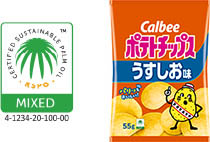Responsible procurement that respects human rights and the environment
The Calbee Group Procurement Policy was established in 2016 with the goal of achieving responsible procurement that respects human rights and the environment, and was subsequently amended in 2022. The Calbee Group procures a variety of raw materials from both domestic and overseas suppliers. We conduct assessments of these suppliers to address social issues in their supply chains, such as environmental concerns and human rights, and are committed to enhancing our engagement with them to mitigate risks as well as create opportunities.
Establishment of policies that take human rights and the environment into account
Based on the Calbee Group Code of Conduct, we have established and amended various policies to respond to major changes in the social environment surrounding our business.
| Date of establishment/ amendment | Applicable policy, etc. | Points regarding establishment/ amendment |
|---|---|---|
| February 2018 | Statement Relating to UK Modern Slavery Act | Make annual declaration of respect for internationally recognized human rights and non-tolerance of forced labor, human trafficking and child labor. |
| October 2021 | Calbee Group Code of Conduct | Incorporate respect for human rights that is in compliance with international norms to engage in activities for the international community |
| April 2022 | Calbee Group Procurement Policy | Make a clear intent to promote initiatives for human rights and environmental issues in the supply chain |
| Calbee Group Palm Oil Procurement Policy |
Support NDPE* and procure palm oil in a way that is not complicit in environmental destruction or human rights violations. *NDPE: No Deforestation, No Peat, No Exploitation |
|
| March 2024 | Signatory to the United Nations Global Compact | Support efforts in the four focus areas of the United Nations Global Compact, namely, human rights, labor, the environment, and anti-corruption. |
| Calbee Group Human Rights Policy | Clearly state our basic principles regarding human rights and identify salient issues for the Calbee Group. |
Broadening procurement assessment
Since FY2023, we have been conducting assessments on efforts in environmental conservation, respect for human rights, and compliance with laws. In FY2024, we engaged with over 100 domestic and overseas suppliers and conducted information exchanges to enhance our supply chain.
Main areas covered by the assessment
CSR/Sustainable Procurement Self-assessment Questionnaire
(in accordance with the CSR/Sustainable Procurement Self-assessment Questionnaire published by the Supply Chain Working Group of Global Compact Network Japan)
-
・CSR-related corporate governance
-
・Initiatives regarding respect for human rights
-
・Basic stance on labor practices
-
・Basic stance on environmental initiatives
-
・Promotion of fair corporate activities
Calbee-specific questions
-
・Inquiry into the promotional framework for sustainable procurement of raw materials such as palm oil and paper
-
・Inquiry into environmental activities being carried out
Responsible palm oil procurement
RSPO initiatives to date
Palm oil is the generic term for oil extracted from the fruit of a plant called the oil palm tree. Palm oil is said to be the most widely produced oil in the world due to its high yield per acre and high production efficiency. Indonesia and Malaysia account for about 80% of palm oil production, and in recent years, environmental destruction such as deforestation and loss of biodiversity caused by palm oil plantation development, as well as human rights violations such as forced labor and child labor, have been identified as serious social problems. RSPO*1-certified palm oil is palm oil that has been produced while preventing such environmental and human rights problems from occurring.
By April 2022, the Calbee Group had completed the switch to certified palm oil (Mass Balance model)*2 at all of its domestic factories.
Initiatives surrounding certified palm oil
| Month and year | Description |
|---|---|
| January 2020 | Became a member of the RSPO. |
| May 2020 | Began purchase of RSPO credits equivalent to the amount of oil used by our domestic factories, through the book and claim system*3. |
| March 2021 | Obtained certification under the Mass Balance model. |
| July 2021 | Switched to certified oil at some domestic factories. |
| April 2022 | Switched to certified oil (Mass Balance model) at all Calbee domestic factories that use palm oil (14 sites). |
| September 2022 | Began the use of the RSPO label on packages for six items of four major products. |
Further initiatives with palm oil suppliers
Collaboration with suppliers is essential for the sustainable procurement of palm oil. Since 2022, the Calbee Group has strengthened its relations with its major supplier of palm oil and worked to enhance understanding of the supply chain by obtaining a list of oil mills to improve traceability. At the same time, the Group has been monitoring and conserving forests of high protection value, as well as exchanging various types of information. We are also working to improve sustainability by adopting the landscape approach*4, which provides integrated consideration of the ideal state of local communities, including suppliers, and the natural environment.
*1 RSPO: The abbreviated name of the Roundtable on Sustainable Palm Oil, a non-profit membership organization established by WWF (World Wide Fund for Nature) and stakeholders in the palm oil industry (manufacturers, retailers, environmental organizations, etc.)
*2 Mass Balance system: A certification model in which certified palm oil is mixed with non-certified palm oil in the supply chain. Certified palm oil physically contains non-certified palm oil, but the volume of certified palm oil supplied by certified plantations is guaranteed.
*3 Book and claim system: A model in which credits for certified oil are traded online between palm oil growers and manufacturers/sellers of the end product. This system supports certified palm oil growers by having end users purchase RSPO credits issued by growers based on the volume of certified palm oil produced.
*4 Landscape approach: A regional management methodology that includes collaboration with stakeholders in a landscape (ecosystem)

